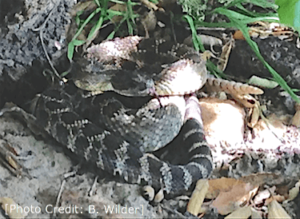 Recently I’ve been pondering a process I call “bewilderment”—or, as I like to pronounce it, be-wilder-ment. It’s like enlightenment, but way less ambitious. I figure if we all become a little wilder, a little more present, a little more connected to whatever it is that makes dogs so damn happy, we’ll feel better and do better things. The first step in the bewilderment process, upon which everything else depends, is simple: CALM DOWN.
Recently I’ve been pondering a process I call “bewilderment”—or, as I like to pronounce it, be-wilder-ment. It’s like enlightenment, but way less ambitious. I figure if we all become a little wilder, a little more present, a little more connected to whatever it is that makes dogs so damn happy, we’ll feel better and do better things. The first step in the bewilderment process, upon which everything else depends, is simple: CALM DOWN.
I had a chance to practice this step when Cloyd, the rattlesnake pictured here, visited my house. My first reaction to Cloyd was a jolt of fear. I sometimes call our reptile brain the “inner lizard,” whose job it is to ensure our survival by making us afraid. But the reptile self might also be snake, like the spiny critters pictured in kundalini yoga. As I regarded Cloyd, it occurred to me that if I could calm the snake inside me, I could probably calm the one on my front porch.
As my fear faded, it became obvious that Cloyd had no intention of attacking me, and would be at a massive disadvantage if he tried. I mean, what if someone took away your arms and legs, then told you to fight a massive creature equipped with limbs, digits, and high technology? Once I moved into this more accurate perspective, it was a simple thing to gently herd Cloyd into the woods, which was what we both wanted.
The whole world functions this way. Real threats do exist, but when we approach life with fear, we see threats in everything, including unconditional love. We puff up in self-defense, which others perceive as aggression. We use violent, extreme words and actions when peaceful attentiveness would work far better.
If you’d like to be-wilder yourself, try this: Whenever you notice that the monologue in your head is fear-based (worrying about the future, belittling yourself, fussing over what others may think) stop, breathe deeply, and switch to a silent loving-kindness meditation, repeating phrases like: “May I be happy. May I be calm. May I feel safe and protected.”
It sounds so simple, because it is. Wild things don’t make speeches, they just notice what’s really in front of them. What’s in front of us is a world where far more goes right than wrong. Think how many things had to go right for you to be reading these words (the survival of our ancestors; the families, food producers, and doctors who kept you and me alive; everyone who invented anything from the alphabet to the smart phone; everything that kept them alive, etc.). Make your mind part of the world’s peace, instead of its fear, and I promise, life will get better and better. And once you’ve calmed down, check back here next month to learn the second step in the bewilderment process!










4 comments
AT 5:11 AM
AT 11:25 PM
AT 1:04 PM
AT 3:28 AM